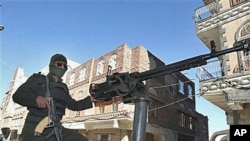Yemeni prosecutors have charged U.S.-born hardline Islamic militant Anwar al-Awlaki with plotting to kill foreigners and with belonging to al-Qaida.
The Yemeni decision to put U.S.-born cleric Anwar al-Awlaki on trial follows a long period of hesitation by the government. The move comes amid strong international pressure on Yemen to act following revelation of a new al-Qaida mail-bomb plot last week.
Charges were filed against al-Awlaki and two other men in the killing of a French security guard last month outside the capital Sana'a.
Al-Awlaki's father is a prominent politician and Yemeni officials have long insisted that proof of his son's activities was needed before any attempt was made to arrest him or put him on trail. The younger Awlaki is thought to be hiding in the mountains of Yemen's Shabwa province.
Al-Awlaki has made numerous sermons calling for jihad or holy war against the United States. Tapes of those sermons, in English, are available on the Internet and in many mosques.
U.S. investigators say the fugitive cleric has ties to the Muslim psychiatrist who went on a shooting spree at Fort Hood, Texas, last year. They also link him to a Nigerian man accused in a failed 2009 Christmas Day airline bombing attempt, as well as another failed bombing in Times Square.
After much debate, the U.S. government put al-Awlaki on a list of Islamic militants it wants captured or killed.
Princeton University Yemen scholar Gregory Johnsen says al-Qaida is a difficult issue to tackle in Yemen, because it continues to have some public appeal.
"I think that al-Qaida puts itself on the right side of a number of different issues in Yemeni society," said Johnsen. "I think there is not a great deal of sympathy for suicide attacks within Yemen, but unfortunately, neither the United States nor the Yemeni government have really been able to make a persuasive argument to convince [Yemenis] that al-Qaida in the Arabian peninsula is bad for the population at large."
Yemeni President Ali Abdallah Saleh vowed during the weekend, "to cooperate fully with the international community in fighting al-Qaida."
Johnsen says Yemen is trying to show it is an active and engaged partner with the United States in the war on al-Qaida, and by trying Anwar al-Awlaki they are attempting to pre-empt possible U.S. action in Yemen.
Yemen Puts US-Born Terrorist Suspect on Trial in Absentia




